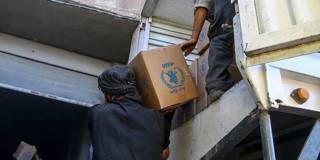In recent months, nongovernmental organizations and journalists have accused the UN of bias toward Syrian President Bashar al-Assad’s regime and failure to distribute humanitarian aid to rebel-controlled areas in Syria. Insofar as this is true, it is because the UN's Charter limits its options.
LONDON – In recent months, nongovernmental organizations and journalists have accused the United Nations of bias toward Syrian President Bashar al-Assad’s regime and failure to distribute humanitarian aid to rebel-controlled areas of Syria. To an extent, these criticisms are justified. The UN does work closely with the Syrian government, and humanitarian aid has not consistently reached areas outside of government control. But the detractors overlook an inherent contradiction in the UN’s responsibilities in countries facing civil war.

LONDON – In recent months, nongovernmental organizations and journalists have accused the United Nations of bias toward Syrian President Bashar al-Assad’s regime and failure to distribute humanitarian aid to rebel-controlled areas of Syria. To an extent, these criticisms are justified. The UN does work closely with the Syrian government, and humanitarian aid has not consistently reached areas outside of government control. But the detractors overlook an inherent contradiction in the UN’s responsibilities in countries facing civil war.